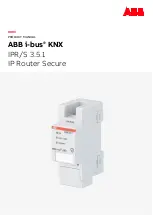
116
D-Link DSL-X1852E User Manual
Appendix B - Networking Basics
Statically Assign an IP address
1. If you are not using a DHCP capable gateway/router, or you need to assign a static IP address, please follow the steps below:
Windows® 11/10
Start> Settings > Network & Internet.
Windows® 7 /8
Start > Control Panel > Network and Internet > Network and Sharing Center
Windows® XP
Start > Control Panel > Network Connections
2.
Select
Wi-Fi > Manage known networks
. For Windows 7/8/XP, click
Change adapter settings.
Choose the network you
want to modify, right-click on it, then select
Properties.
3. Under
IP assignment
, select
Edit
. For Windows 7/8/XP, Select the
Networking
tab. Under
This connection uses the
following items
, select
Internet Protocol Version 4 (TCP/IPv4)
or
Internet Protocol Version 6 (TCP/IPv6)
. Then select
Use
the Following IP Address
.
4. Under
Edit network IP settings
or
Edit IP settings
, select
Manual
. If IPv4 is selected, type the IP address settings in
IP
address, Subnet prefix length
(subnet mask), and
Gateway
fields. If IPv6 is selected, type the IP address settings in
IP
address, Subnet prefix length,
and
Gateway
fields. The prefix-length in IPv6 has the same function as the subnet mask in
IPv4: determine the subnetwork. However, it is expressed as an integer between 1 through 128
as opposed to four octets in IPv4.
Example: Enter x.x.x.x for IPv4 addressing scheme (where x is between 0 and 255)
and xxxx:xxxx:xxxx:xxxx:xxxx:xxxx:xxxx:xxxx for IPv6 addressing scheme
(where x is a hexadecimal digit).
Set Preferred DNS the same as the LAN IP address of your router.
The Alternate DNS is only optional or you may enter a DNS server from your ISP.
5. When you’re done, click
Save
.
















































